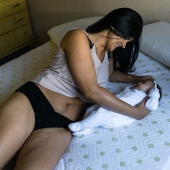Many people feel their experience of birth was traumatic. Read about the causes, treatment, and how to support someone who has experienced birth trauma.
What is (birth) trauma?
Trauma describes the distress felt after undergoing an event that felt traumatic. Birth trauma is sometimes felt after experiencing a birth (Birth Trauma Association, no date a). However, traumatic birth should not be considered normal.
Birth partners can experience trauma after witnessing a birth (Birth Trauma Association, no date a).
Whatever your experience, it is important that you are listened to and that you can express how events made you feel.
What might make a birth feel traumatic?
There are many things which might make a birth traumatic, but there is no strict definition of what that is. Every person’s experience is different, and trauma can be triggered by both physical and emotional experiences.
While emergency situations might seem traumatic, sometimes trauma is experienced when the birth appears to others to be straightforward (Birth Trauma Association, no date a).
For example, some people describe the way health professionals treated them during the birth as traumatising (Reed et al, 2017). Trauma like this need not happen, and new parents might feel angry about it.
For others, previous sexual or other abuse can lead to birth feeling traumatic (NHS, 2022a).
What is PTSD?
Some people who experience trauma are diagnosed with Post Traumatic Stress Disorder (PTSD). This diagnosis confirms that symptoms are severe and persistent enough to have a significant impact on the person’s life (NHS, 2022b).
The Birth Trauma Association states that around 5 in 100 women and birthing people experience PTSD after birth. This number is around 1 in 100 fathers, co-parents and birth partners (Birth Trauma Association, no date a).
Experiencing miscarriage, stillbirth or neonatal death might also lead to PTSD (NICE, 2014).
In addition to previous trauma, a lack of social support, or previous depression or anxiety means some people are more likely to develop PTSD after a traumatic event (NHS, 2022a; NICE, 2018).
What effect can trauma and PTSD have?
Traumatic birth affects people in different ways. It can take some time to come to terms with what has happened.
Many people who experience a traumatic birth find it difficult to bond with their baby. But this is also true for some people who have not had a traumatic experience. Loving bonds develop over time (Birth Trauma Association, no date a).
Physical birth trauma
There doesn’t have to be physical harm for there to be mental harm. However, some trauma experienced during the birth can be physical. Read our articles on perineal tears and postpartum haemorrhage or PPH.
How might PTSD be experienced?
Not everyone who experiences a traumatic event will get PTSD. Not everyone who gets PTSD experiences it in the same way. Mostly it shows up in the first month after the event, but it can also appear much later (NHS, 2022c).
The ways in which trauma is felt include (Birth Trauma Association, no date a; NHS, 2022c; NICE, 2018):
- Re-experiencing the event – which might involve nightmares or flashbacks about the birth
- Avoidance – avoiding any reminders about birth, and not wanting to talk to people about the birth
- Hyperarousal – feeling on high alert all the time, angry and irritable
- Negative mood and sense of self – feeling low, guilty, or worthless
- Numbness, dissociation, or memory loss
There might also be (NHS, 2022c):
- anxiety or depression
- self-harm
- drug or alcohol misuse
- other physical symptoms such as head or stomach aches
With all this going on, an experience of trauma can lead to problems at work and in relationships (NHS, 2022c).
Birth partner experiences of trauma
Fathers, co-parents and birth partners might feel guilty for experiencing birth trauma as they weren't the ones that physically gave birth (Birth Trauma Association, no date b).
But they can also experience trauma from witnessing a birth, or thinking the mother, birthing parent or baby might die. They might have felt distressed by not being able to help (Birth Trauma Association, no date b).
Parents who didn’t give birth are less likely to be asked how they are feeling after the birth, and may have returned home alone with no-one to talk to about what happened (Birth Trauma Association, no date b).
The Birth Trauma Association has information and support for birth partners experiencing trauma or PTSD.
Treatment options for trauma
No matter how long ago the trauma was experienced, it is possible to resolve it (NHS, 2022d).
Birth Afterthoughts
NHS Birth Afterthoughts, which is sometimes called Birth Reflections or Birth Debriefing, is offered in some NHS Trusts and Boards. It is a space to talk about the experience with a midwife.
This is not treatment, but it can address unanswered questions or concerns and help people understand what happened during the birth.
We would recommend that anyone deciding to access this service is accompanied by an independent person for support.
The service isn’t available everywhere, so it is worth asking the doctor or midwife about it.
Active monitoring
Active monitoring is the first step offered by a GP, because 2 in 3 people who experience a traumatic event will be feeling better after a few weeks. If someone is still struggling after a month then they should be directed to further medical support (NHS, 2022d).
Talking therapies
Talking therapy is the next suggestion if the feelings have not resolved after a month. You can ask for referral from the GP or self-refer directly to an NHS service (NHS, 2022d).
Self-referral is available in (NHS, 2022e; NHS 111 Wales, 2024; Gov.je, no date; Gov.IM, no date):
In Scotland and Northern Ireland referral is made by the GP (NIDirect.gov.uk, no date; NHS Inform, 2024).
Talking therapies help people think differently about their experiences, and include (NHS, 2022d):
While NHS treatment will be free, there might be a long waiting list.
If you decide to seek private treatment, check the credentials of the doctor and make sure they are trained in both birth and trauma. Treatment may be available more quickly, but will have to be paid for.
Medication
For some people, talking therapy is either not suitable or not enough. For them, specific anti-depressants suitable for PTSD may be an option (NHS, 2022d).
A course of medication is usually for 12 months, and then withdrawn over a month (NHS, 2022d).
If breastfeeding, ask the doctor if the medication is suitable, or check it yourself at the Breastfeeding Network Drug Factsheets.
How to support someone with birth trauma
Each person experiences a birth in a different way, so while it might feel fine to one person, another may be very distressed after the same experience. It’s good to acknowledge that what someone is feeling is real and valid, even if it doesn’t make sense to you.
- Avoid being judgmental or dismissive of someone’s feelings. Everyone’s emotional wellbeing is as important as a healthy baby.
- It can be hard to prioritise enjoyable activities. Always listen to what the person feels able to achieve and start small. Where there are also physical challenges, encourage but don’t push.
- The GP or Health Visitor can refer to the local mental health team for a diagnosis and to discuss treatment options.
If you’re worried about someone expressing suicidal feelings, contact:
- the midwifery team if still under their care
- a GP or NHS 111
- Samaritans on 116 123 for confidential, 24-hour support
- 999 if they are in immediate danger
- SHOUT is a text option for those that don’t want to talk on the phone – text 85258
Feedback about maternity care
Some parents may want to feed back about their care. This might be to thank staff, to get an apology, or to prevent the same situation happening to someone else.
Any feedback can be made directly to the maternity service using contact details on their website. It is also worth copying in the local Maternity and Neonatal Voices Partnership.
Birth after trauma
Experiencing birth related trauma or PTSD can affect how you may feel about future pregnancies. Make Birth Better offers support with pregnancy and birth after trauma.
Further support
The Birth Trauma Association provides support and resources for those experiencing birth trauma and PTSD.
Mental health charity MIND has information about how to help someone who’s struggling after the birth of a baby.
Birth Trauma Association (no date a) What is birth trauma? https://www.birthtraumaassociation.org/what-is-birth-trauma [28 May 25]
Birth Trauma Association (no date b) Fathers and non-birthing mothers. https://www.birthtraumaassociation.org/fathers [28 May 25]
Gov.IM (no date) Community Wellbeing Service Self-Referral. https://manxcaredig.powerappsportals.com/Community-Wellbeing-Service-Se… [8 Jul 25]
Gov.je (no date) Jersey Talking Therapies (JTT). https://www.gov.je/Health/Mental/Pages/JerseyTalkingTherapies.aspx [8 Jul 25]
NHS (2022a) Causes – Post-traumatic stress disorder. https://www.nhs.uk/mental-health/conditions/post-traumatic-stress-disor… [29 May 25]
NHS (2022b) Overview - Post-traumatic stress disorder. https://www.nhs.uk/mental-health/conditions/post-traumatic-stress-disor… [28 May 25]
NHS (2022c) Symptoms – Post-traumatic stress disorder. https://www.nhs.uk/mental-health/conditions/post-traumatic-stress-disor… [29 May 25]
NHS (2022d) Treatment – Post-traumatic stress disorder. https://www.nhs.uk/mental-health/conditions/post-traumatic-stress-disor… [29 May 25]
NHS (2022e) NHS talking therapies for anxiety and depression. https://www.nhs.uk/mental-health/talking-therapies-medicine-treatments/… [29 May 25]
NHS 111 Wales (2024) Counselling. https://111.wales.nhs.uk/counselling/ [8 Jul 25]
NHS Inform (2024) What is Counselling? https://www.nhsinform.scot/tests-and-treatments/counselling-and-therapi… [8 Jul 25]
NICE (2014) Antenatal and postnatal mental health: clinical management and service guidance. https://www.nice.org.uk/guidance/cg192/ [29 May 25]
NICE (2018) Post-traumatic stress disorder [NG116]. https://www.nice.org.uk/guidance/ng116 [28 May 25]
NIDirect.gov.uk (no date) Mental Health Services. https://www.nidirect.gov.uk/articles/mental-health-services [8 Jul 25]
Reed R, Sharman R, Ingliss C. (2017) Women’s descriptions of childbirth trauma relating to care provider actions and interactions. BMC Pregnancy Childbirth. 17:21. https://doi.org/https://doi.org/10.1186/s12884-016-1197-0








